
Melody Ranch is a 1940 Western musical film directed by Joseph Santley and starring Gene Autry, Jimmy Durante, and Ann Miller. Written by Jack Moffitt, F. Hugh Herbert, Bradford Ropes, and Betty Burbridge, the film is about a singing cowboy who returns to his hometown to restore order when his former childhood enemies take over the frontier town. In 2002, the film was added to the National Film Registry by the National Film Preservation Board and selected for preservation as being "culturally, historically, or aesthetically significant."

Wild West C.O.W.-Boys of Moo Mesa is a 1992 American animated television series created by comic book artist Ryan Brown, known for his work on Teenage Mutant Ninja Turtles. It aired as part of ABC's Saturday morning lineup.
Secret Valley is a children's television adventure series created by Terry Bourke and Roger Mirams. It was produced by the Grundy Organisation from Australia in association with Telecip from France and Televisión Española (TVE) from Spain. It was first aired in 1980 on the ABC in Australia, and in 1982 on TVE 2 in Spain. It spawned a spin-off series in 1986 titled Professor Poopsnagle's Steam Zeppelin.

Byron Kay Foulger was an American character actor who over a 50-year career performed in hundreds of stage, film, and television productions.

Cowboy culture is the set of behaviors, preferences, and appearances associated with the attitudes, ethics, and history of the American cowboy. The term can describe the content or stylistic appearance of an artistic representation, often built on romanticized impressions of the wild west, or certain aspects of people's lifestyle, such as their choices in recreation, apparel, and western or southwestern cuisine.

In Old Santa Fe is a 1934 American Western film directed by David Howard, starring Ken Maynard, George "Gabby" Hayes and Evalyn Knapp and featuring the first screen appearance of Gene Autry, singing a bluegrass rendition of "Wyoming Waltz" accompanied by his own acoustic guitar with Smiley Burnette on accordion. Autry and Burnette were uncredited, but the scene served as a screen test for the duo for subsequent singing cowboy films, beginning with The Phantom Empire (1935), in which Autry had his first leading role.

Tumbling Tumbleweeds is a 1935 American Western film directed by Joseph Kane and starring Gene Autry, Smiley Burnette, and Lucile Browne. Written by Ford Beebe, the film is about a cowboy who returns home after a five-year absence to find his father murdered and his boyhood pal accused of the dastardly deed. Tumbling Tumbleweeds features the songs "Riding Down the Canyon", "That Silver-Haired Daddy of Mine", and the Bob Nolan classic "Tumbling Tumbleweeds".
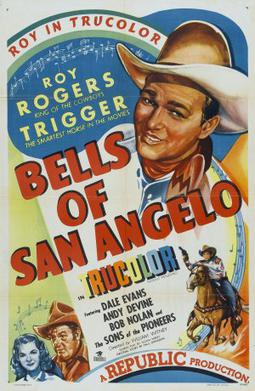
Bells of San Angelo is a 1947 American Trucolor Western film directed by William Witney and starring Roy Rogers. The first Roy Rogers film shot in Trucolor, this modern day Western mixes half a dozen songs with mystery, international smuggling of silver, violence, a pack of dogs and comedy relief with one character packing a "16-shooter" from which 22 shots can be heard during the musical number "Hot Lead" performed by the Sons of the Pioneers.
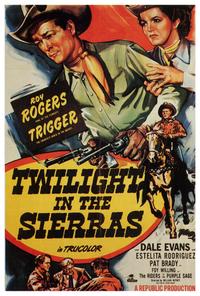
Twilight in the Sierras is a 1950 American Trucolor Western film directed by William Witney and starring Roy Rogers and his horse Trigger, along with Dale Evans, Estelita Rodriguez, and Pat Brady.

Arizona Gunfighter is a 1937 American western film directed by Sam Newfield and starring Bob Steele, Jean Carmen and Ted Adams. It was produced and distributed by Republic Pictures.
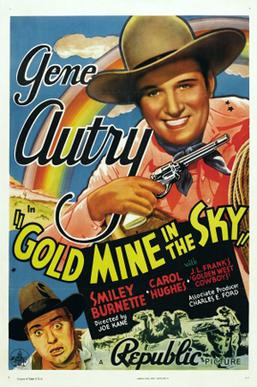
Gold Mine in the Sky is a 1938 Western film directed by Joseph Kane and starring Gene Autry, Smiley Burnette, and Carol Hughes. Based on a story by Betty Burbridge, the film is about a singing cowboy and ranch foreman who, as executor of the owner's will, must see that the daughter and heiress does not marry without his approval.

The Battleground Gunfight, also known as the Battleground Shootout, was a gunfight between a posse of American lawmen and the Smith Gang. It was fought on October 8, 1901, within Arizona Territory's Fort Apache Indian Reservation, at a clearing in the forest known today as the "Battleground". Nine Arizona Rangers and deputies caught up with the cattle rustler Bill Smith and his gang. During a long exchange of gunfire that followed, Ranger Carlos Tafolla and Deputy Bill Maxwell were killed and one or two of the outlaws may have been wounded. In the end, the Smith Gang escaped the posse and fled into Mexico.
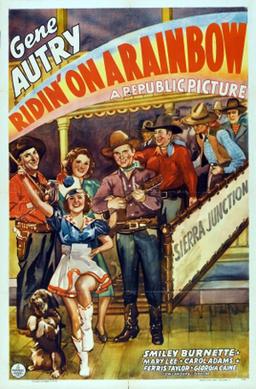
Ridin' on a Rainbow is a 1941 American western musical film directed by Lew Landers and starring Gene Autry, Smiley Burnette and Mary Lee. Written by Bradford Ropes and Doris Malloy, based on a story by Ropes, the film is about a singing cowboy whose investigation of a bank robbery takes him to a showboat, where he finds that a teenage singer's father has been working with the robbers to provide for her future. The film received an Academy Award nomination for best original song for "Be Honest with Me".
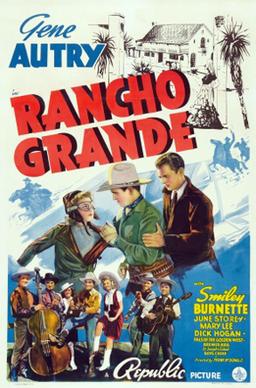
Rancho Grande is a 1940 American Western film directed by Frank McDonald and starring Gene Autry, Smiley Burnette, and June Storey. Written by Bradford Ropes, Betty Burbridge, and Peter Milne, based on a story by Peter Milne and Connie Lee, the film is about a singing cowboy and ranch foreman responsible for completing an important irrigation project and for the three spoiled grandchildren of his former boss who come out West to the ranch they inherited.
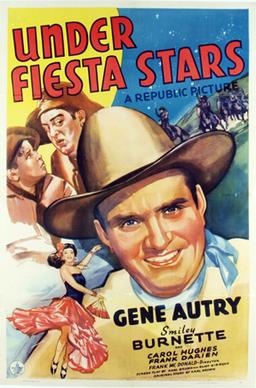
Under Fiesta Stars is a 1941 American western film directed by Frank McDonald and starring Gene Autry, Smiley Burnette, and Carol Hughes. Based on a story by Karl Brown, the film is about a singing cowboy and rodeo champion who inherits a ranch and mining property along with his foster father's niece. She wants to sell but needs his consent, and he wants to work the mine according to his foster father's wishes. Problems arise when the niece unwittingly gets involved with unscrupulous lawyers who are plotting to steal the mine. The film features the songs "Purple Sage in the Twilight", "When You're Smiling", and the title song.

Robbers of the Range is a 1941 American western film directed by Edward Killy and starring Tim Holt, Virginia Vale, Ray Whitley and Emmett Lynn. It was the third in Tim Holt's series of Westerns for RKO Pictures. Holt fractured two bones in his foot in an accident during filming.

Cyclone on Horseback is a 1941 American western film directed by Edward Killy and starring Tim Holt, Marjorie Reynolds and Ray Whitley. It was produced and distributed by RKO Pictures. Tom Stempel thought the film "features a livelier heroine than is usual in B westerns."
Trail of the Vigilantes is a 1940 75-minute black-and-white Western comedy directed by Allan Dwan, written by Harold Shumate, and featuring Franchot Tone, Warren William, Broderick Crawford and Andy Devine.

The Plunderers is a 1948 American Western film directed by Joseph Kane and written by Gerald Geraghty and Gerald Drayson Adams. The film stars Rod Cameron, Ilona Massey, Lorna Gray, Forrest Tucker, George Cleveland and Grant Withers. The film was released on October 31, 1948, by Republic Pictures.
The Dalton Gang is a 1949 American Western film starring Don "Red" Barry and Julie Adams. It was directed by Ford Beebe.

















